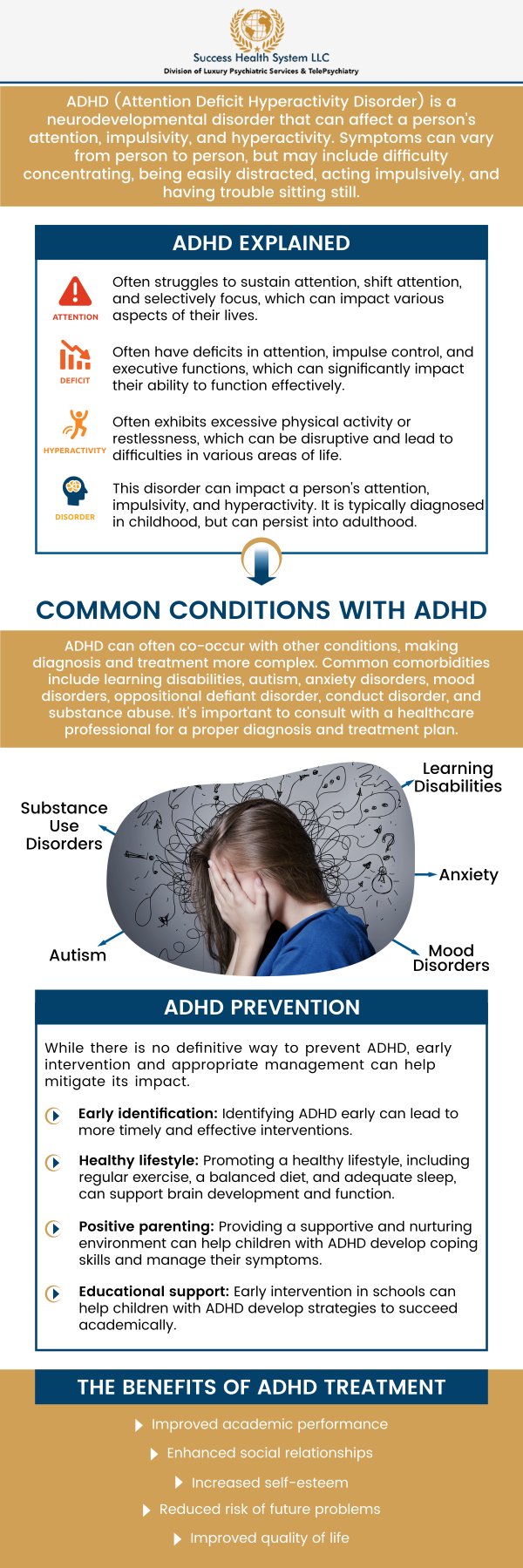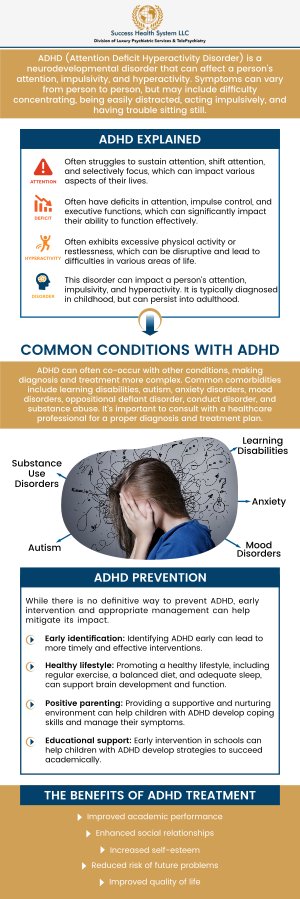How Is ADHD Diagnosed?
Attention Deficit Hyperactivity Disorder (ADHD) is a chronic mental health condition that affects a person’s ability to focus, concentrate, and control their impulses. ADHD can often go undiagnosed, leaving patients struggling to cope with everyday tasks and responsibilities without realizing that they do, in fact, have a disorder. Our board-certified psychiatrist and mental health specialist. Dr. Moses Tabe Ambilichu M.D. would be happy to provide you with the professional assessment that you need to get your health back on track. If you’re struggling and would like to get assessed for ADHD or another mental health condition, contact us at Success Health System or schedule an appointment. We have convenient locations to serve you in Creve Coeur MO, Independence MO, and Columbia MO.




Table of Contents:
How do psychiatrists diagnose ADHD?
What is the root cause of ADHD?
Does untreated ADHD get worse with age?
What does untreated ADHD look like?
The diagnosis of ADHD generally involves a comprehensive evaluation of a patient’s mental health history, physical exam, and observation of their behavior. Psychiatrists and other healthcare providers use clinical guidelines to determine whether a patient meets the criteria for ADHD, such as those found in the Diagnostic and Statistical Manual of Mental Disorders (DSM-V) and the International Statistical Classification of Diseases and Related Health Problems (ICD-10).
During an evaluation, the psychiatrist may conduct a clinical interview with the patient or the people closest to the patient to learn about their behaviors, symptoms, medical and family history, and social and educational background. The psychiatrist may also use various ADHD rating scales to evaluate the severity of the patient’s symptoms, including questionnaires completed by the patient, their parents, teachers, or other caregivers.
The psychiatrist will observe the patient’s behavior in various settings, such as school, home, or community, to assess their ability to concentrate, follow instructions, complete tasks, and interact with others, while looking for adjoining symptoms such as impulsivity, inattention, and hyperactivity.
While the exact root cause of ADHD remains unknown, there are various factors that experts believe contribute to its development.
Initial research suggests that ADHD might be caused by environmental factors such as exposure to toxins, smoking during pregnancy, premature birth, and low birth weight.
Genetics might also play a significant role in the development of ADHD, with studies showing that this condition is more common in those who have close family members with ADHD.
Brain structure and function abnormalities are also thought to contribute to the development of ADHD, as some of these irregularities include reduced brain activity in the areas responsible for sustained attention and hyperactivity, as well as changes in neurotransmitter levels.
As children grow older, their symptoms of ADHD may change but the severity of ADHD symptoms can remain consistent or worsen with age – especially without treatment.
The underlying neurobiological differences in a person with ADHD don’t disappear over time. Instead, people with ADHD tend to experience a compounding effect, where the negative outcomes of their condition are heightened.
Untreated ADHD in childhood can lead to several negative outcomes in adulthood, including increased risk for anxiety, depression, substance abuse, and physical health problems. ADHD adults who have gone untreated may also experience difficulty managing emotions, maintaining relationships, managing their finances, or holding onto a stable job.
Untreated ADHD is characterized by symptoms such as difficulty concentrating, impulsivity, forgetfulness, disorganization, restlessness, and hyperactivity.
These symptoms can result in a range of problems, including difficulty in school or at work, struggles in interpersonal relationships, and increased risk-taking behavior. Individuals may struggle with organization and time management, leading to poor academic or work performance. Social relationships may also be impacted, with a tendency towards interrupting conversations or being seen as overly emotional or unpredictable.
If you’re considering getting assessed for ADHD and would like professional and reliable insight, contact us at Success Health System or book in online to schedule an appointment at your earliest convenience. Our team of professional mental health specialists would be happy to answer any questions that you may have so that you can feel good moving towards the next step in your healthcare journey. We have convenient locations to serve you in Creve Coeur MO, Independence MO, and Columbia MO. We serve patients from Creve Coeur MO, Independence MO, Columbia MO, Overland MO, Bridgeton MO, Blue Springs MO, Kansas City MO, Midway MO, and surrounding areas.

Check Out Our 5 Star Reviews


Additional Services You May Be Interested In
▸Addiction Treatment
▸ADHD Treatment
▸Anxiety Treatment
▸Bipolar Disorder
▸Depressive Disorders
▸Mental Disorder
▸Obsessive Compulsive Disorders
▸Psychotic Disorders
▸PTSD Treatment
▸Phobias and Fears Therapist
▸Psychiatrist
▸Substance Disorder
▸Social Anxiety Psychiatrist
▸Medication Management
▸Psychotherapy
▸Exomind TMS – Columbia
▸Spravato – Independence

Additional Services You May Be Interested In
▸Addiction Treatment
▸ADHD Treatment
▸Anxiety Treatment
▸Bipolar Disorder
▸Depressive Disorders
▸Mental Disorder
▸Obsessive Compulsive Disorders
▸Psychotic Disorders
▸PTSD Treatment
▸Phobias and Fears Therapist
▸Psychiatrist
▸Substance Disorder
▸Social Anxiety Psychiatrist
▸Medication Management
▸Psychotherapy
▸Exomind TMS – Columbia
▸Spravato – Independence





